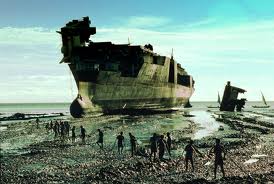This novel is INTENSE. I was first attracted to the book because of it's awesome cover. The photo here doesn't do it justice: in real life you can clearly see that it is meant to look like weathered metal, probably copper, and the title looks as if it's been etched into the metal. Gorgeous.
Once I got past the cover, the story itself drew me in faster than any book I've read recently. The story opens in an extremely claustrophobic setting as Nailer, a teenage boy, clambers through a service duct on a grounded oil tanker.
Ship Breaker takes place in a future when oil is scarce and discharged oil tankers are docked on the the coast to be broken down for parts. Nailer's job, along with the rest of the teenage crew, is to scavenge copper wiring from grounded ships (thus: ship breaking). Smaller kids like Nailer are preferred for this work, because they can easily navigate the narrow ducts in the tankers.
Listen to this nail-biting description of one of Nailer's salvage missions:
All around, the duct pinged and creaked. It sank slightly, tilting. The whole thing was on the verge of collapse. Nailer's frantic activity and extra weight had weakened it. ...Metal shrieked. The duct dropped out from under him. Nailer scrabbled for handholds as his world gave away. His fingers seized scavenged wire. For a second it held, suspending him above an infinite pit. Then the wire tore loose. He plummeted...
Aargh! **bites nails**
Nailer and his friends live in the Gulf Coast region where the worst of the frequent storms that rip along the coast are nicknamed "City Killers": storms so intense that the obliterate anything in their path. In Ship Breaker's dystopian future, global warming is NOW and New Orleans has sunk, twice. I know, know. I hear you saying: "This all sounds terribly grim. Why would I want to read another dystopian YA novel that's so unrelentlingly BLEAK?" Well, for one, Bacigalupi is an amazing author. I read this book late into the wee hours of the morning because I needed to know what would happen next. Brilliant pacing. And secondly, as with many dystopian novels, there is a hopeful undercurrent. Nailer's life is all hard knocks and he has an extremely dysfunctional relationship with his dad. His dad is a drug addict who thinks only of when and where his next fix will come from. So, ever resilient, Nailer finds family in his friend Pima and her mother, Sadna.
Family. It was just a word. Nailer could spell it now. Could see all the letters strung together. But it was a symbol, too....Family wasn't any more reliable than marriages or friendships or blood sworn crew , and maybe less. His own father really would gut him if he ever got hold of him again; it didn't matter if they shared blood or not....But Nailer was pretty sure that Sadna would fight for him tooth and nail, and maybe even give up her life to save him.
Nailer ALWAYS finds a way. He never gives up. Sure he falters and stumbles at times, but there's always a will. It's easy to draw similarities between Ship Breaker and The Hunger Games; between Nailer and Katniss. Both Nailer and Katniss are prisoners of circumstance who have to rely upon their own inner resourcefulness. And both books play around with the subject of class, comparing the haves to the have nots. In Ship Breaker's future there is no middle class: the rich are rich and the poor are dirt poor.
I recommend Ship Breaker to anyone who's enjoyed some of the more popular dystopian teen fiction of the last little while: The Maze Runner, The Hunger Games, and Divergent. This is also an excellent novel "for the dudes."
-Erica
 So imagine, if you will, my girlish squeal of delight when, one morning, my boss handed me a package addressed to Edge of Seventeen. Mail! Yay!
So imagine, if you will, my girlish squeal of delight when, one morning, my boss handed me a package addressed to Edge of Seventeen. Mail! Yay!





